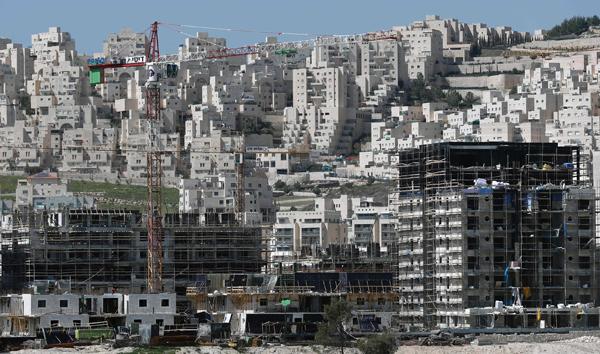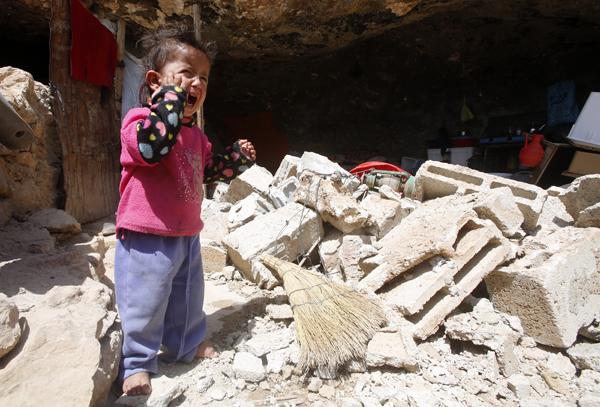You are here
Israel razing Palestinian buildings at 'alarming' rate — UN
By AFP - Mar 08,2016 - Last updated at Mar 08,2016

A general view shows buildings under construction in an Israeli settlement in Jabal Abu Ghneim, East Jerusalem, on Monday (AFP photo)
OCCUPIED JERUSALEM — Israel is razing Palestinian homes and other buildings constructed with international aid at an "alarming" rate, the UN says, with more demolitions so far this year than in all of 2015.
In total 121 structures funded partly or fully by international donors were demolished in the occupied West Bank between January 1 and March 2, overtaking the 108 from all of 2015, according to UN figures seen by AFP.
The projects include homes for Palestinians and at least one school, as well as temporary structures such as pens for animals and sheds.
Robert Piper, UN humanitarian coordinator for the Palestinian territories, wrote in response to an AFP query that the demolitions were "alarming".
"We have already surpassed the total number of humanitarian aid items destroyed or confiscated in all of 2015, in just the first 10 weeks of 2016," Piper said.
"We will be protesting to the Israeli authorities of course, as are many in the diplomatic community."
Vance Culbert, country director at the Norwegian Refugee Council NGO, recently said there were "tens of millions of dollars of donor assistance which are at risk of demolition".
Israel says the projects are built illegally so can be demolished, but aid groups argue that obtaining necessary permits is nearly impossible.
COGAT, the Israeli defence ministry body responsible for implementing government policies in the Palestinian territories, declined to comment on the number of demolitions, saying only that it takes "enforcement steps against any illegal construction" after issuing demolition orders.
US State Department spokesman John Kirby last week warned of a "damaging trend of demolition, displacement, and land confiscation" that calls "into question the Israeli government's commitment to [the] two-state solution".
EU labelling fight
Moti Yogev, an MP from the far-right Jewish Home Party who heads an Israeli parliament sub-committee on the West Bank, said the rise in demolitions was likely in response to European Union measures on imports of goods from Israeli settlements in the West Bank.
"I have no doubt that the government's firm stance is in part a result of the unilateral measures taken by Europe," Yogev, whose party has ministers in the government, told AFP.
In November, new EU guidelines were issued forcing member countries to label imported produce from the settlements, sparking condemnation from Prime Minister Benjamin Netanyahu.
The UN's Piper said a number of factors may have contributed to the increase in demolitions, including the EU decision, growing domestic pressure on the government amid a wave of Palestinian attacks and a "renewed push to advance settlement expansion plans in these areas".
Eitan Dangot, a former head of COGAT, told AFP that such a spike would ultimately be Netanyahu's decision.
"In the end it is a policy of the prime minister and the government."
He said that many of the demolitions involve temporary structures.
"It is things that are very light that are destroyed," he said.
Under the 1990s Oslo peace accords, the Palestinian West Bank is divided into three areas.
Area C, which accounts for about 60 per cent of the territory, is under full Israeli control and Palestinians say it is nearly impossible for them to obtain building permits in the area.
Just 1.5 per cent of Palestinian building permit applications have been approved in recent years, according to the United Nations.
The Israeli army says the homes have been built without permission from their authorities.
Yogev said the EU was spending millions of euros per year on what he called "illegal construction".
"I call it construction terror," he said.
Related Articles
Um Al Kheir, Palestinian Territories — Israel demolished five homes in the occupied West Bank on Tuesday, leaving 27 Palestinians homeless,
OCCUPIED JERUSALEM — Israeli forces demolished dozens of structures including a school in the northern West Bank last week, leaving 10 famil
BRUSSELS — The European Union must raise political pressure on Israel over accelerating West Bank demolitions that run against international



















